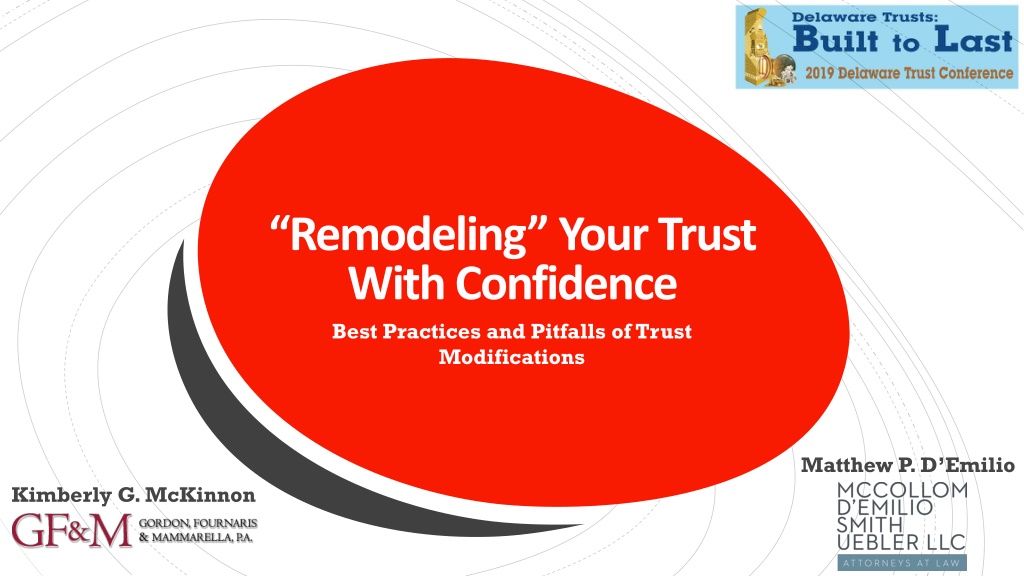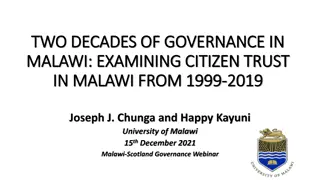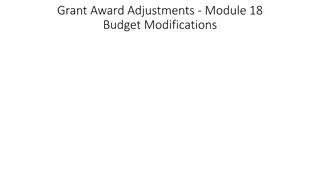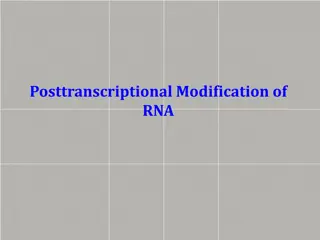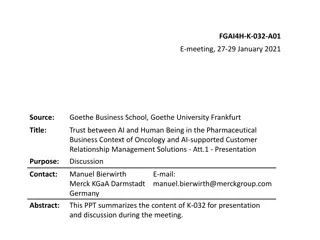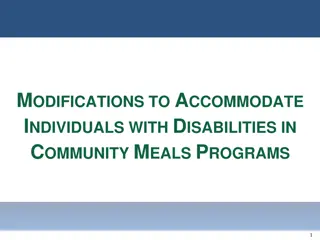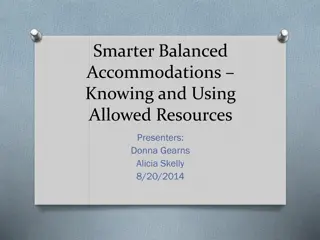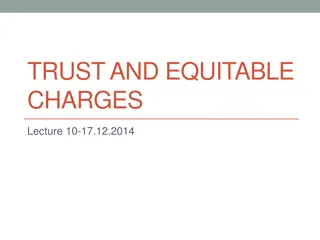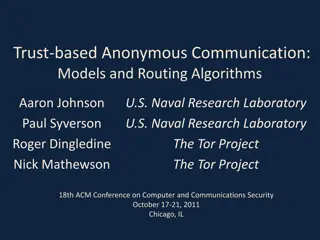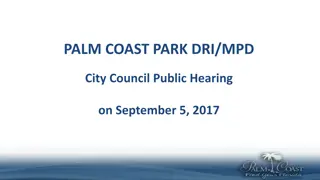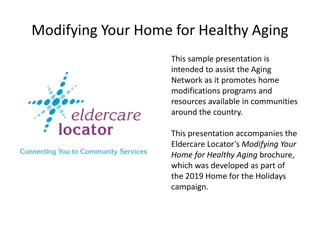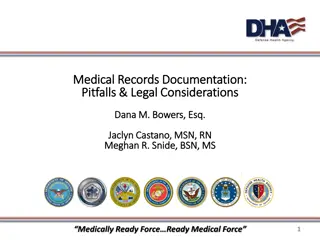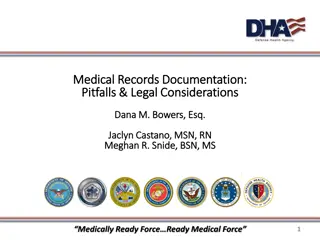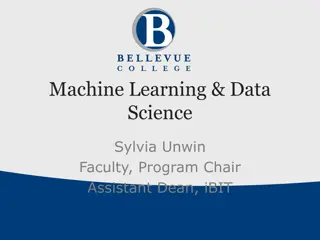Trust Modifications: Best Practices and Pitfalls
Common law allows for modification of irrevocable trusts with consent from settlor and beneficiaries, but changes must align with trust purpose. Recent trends show more flexibility in trust modifications, with new statutory remedies and tools like decanting and nonjudicial settlement agreements. However, pitfalls like using the wrong jurisdiction's law or not strictly adhering to statutory requirements can lead to invalid modifications and trustee liability.
Download Presentation

Please find below an Image/Link to download the presentation.
The content on the website is provided AS IS for your information and personal use only. It may not be sold, licensed, or shared on other websites without obtaining consent from the author.If you encounter any issues during the download, it is possible that the publisher has removed the file from their server.
You are allowed to download the files provided on this website for personal or commercial use, subject to the condition that they are used lawfully. All files are the property of their respective owners.
The content on the website is provided AS IS for your information and personal use only. It may not be sold, licensed, or shared on other websites without obtaining consent from the author.
E N D
Presentation Transcript
Remodeling Your Trust With Confidence Best Practices and Pitfalls of Trust Modifications Matthew P. D Emilio Kimberly G. McKinnon
Common law has long provided for modification of irrevocable trusts Long standing American view of common law trust modification Trust Modification Under Common Law If the settlor and all beneficiaries agree, they can compel modification/termination Even if the settlor does not consent, the beneficiaries can compel modification/termination. However, the modification/ termination can be denied if the change is contrary to a material trust purpose (the Claflin rule).
Changing views that the traditional standards for trust termination/modification were significantly too restrictive see Uniform Trust Code and Third Restatement of Trusts Modifications on the Rise Proliferation of Dynasty Trusts New statutory modification remedies in many jurisdictions Virtual representation statutes now work to bind minor, incapacitated, and unborn beneficiaries
Decanting (12 Del. C. 3528) Nonjudicial Settlement Agreement (12 Del. C. 3339) Modification Remedies Merger (12 Del. C. 3329(27)) Modification by Consent Agreement (12 Del. C. 3342)
Pitfall Using the wrong jurisdiction s law to modify the governing instrument Consequences Invalid decanting, merger, NJSA, or consent agreement Trustee liability Follow the Law Best Practices Carefully review the governing instrument Inquire into succession of trustees Obtain all applicable court orders Consult counsel in originating jurisdiction Inquire into previous changes of situs/governing law Determine where administration is occurring
Pitfall Not strictly adhering to the statutory requirements Decanting Power to invade principal or income or both Cannot add beneficiaries No extension of vesting if trust contains IRC 2503(c) gifts Cannot reduce income interest if marital deduction trust Cannot decant assets subject to presently exercisable power of withdrawal Writing signed by trustee NJSA Written consent of all interested parties Cannot violate material purpose of trust Does not change the trust s purpose in a manner that would violate 12 Del. C. 3303(b) if the change was effected by a court order Merger Does not result in a material change in the dispositive terms of the trust defining the nature and extent of any trust beneficiary s interest in the principal or income of the trust Consent Agreement Written consent or nonobjection of Trustor, all fiduciaries, and all beneficiaries Follow the Code
Consequences Invalid decanting, merger, NJSA, or consent agreement Subsequent breaches of fiduciary duty for not following correct version of trust agreement Follow the Code Best Practices Read the code (carefully) Follow the Trust Act the Code is updated (improved) annually Draw a diagram (current and remainder beneficiaries) to ensure that all necessary parties are represented
Pitfalls Defining or re-defining descendants issue per stirpes Modifying Beneficial Interests by representation Grantor s children by name Changing Age for adopted beneficiaries Law governing construction Contingent beneficiaries Beneficiaries upon termination Virtual representation failure
Consequences Dilution of beneficial interests Elimination of beneficiaries Loss of GST exempt status Invalid decanting, merger, NJSA, or consent agreement Modifying Beneficial Interests Best Practices Make only minor changes to the dispositive provisions Retain as much of the original trust as possible (as opposed to wholesale re-write) Use caution when changing definitions Check references to a point in time or date of agreement Exercise caution when changing law governing construction
Pitfall Changing the law governing validity and/or construction Consequences Changes to validity Loss of GST exemption due to extension of trust term Change execution formalities Change requirements to trust creation Changes to construction How interests are construed by state law Addition or removal of beneficiaries / change remaindermen Changes to rules relating to allocation of income and principal Modifying Governing Law Best Practices Change only the law governing administration Consider carve-outs If a new trust is created, consider law governing formalities to creation
Pitfall Exercising discretion without notifying beneficiaries Consequences Trustee liability Future challenge to modification Modification without Notification Best Practices Obtain release from all beneficiaries as pre-requisite to modification Provide notification consistent with 12 Del. C. 3585 and timing effective date to expiration of limitations period
Pitfall Failure to obtain consents from all beneficiaries Consequences Invalid decanting, merger, NJSA, or consent agreement Trustee liability Best Practices Know applicable law Include trustees of remainder beneficiaries (12 Del. C. 3547(g)) Consider subjective elements where appropriate (See Mennan v. Wilmington Trust) Consider the consequence when choosing the modification remedy Use all applicable methods to representation Faulty Virtual Representation
Pitfall Modifying a trust agreement to permit further modifications that were not permitted by the first modification Modifications Permitting Modifications Consequences Invalid decanting, merger, NJSA, or consent agreement Trustee liability Best Practices Know applicable law Be conservative
Pitfall Modifying a trust agreement that results in a breach of fiduciary duty Consequences Trustee liability Inappropriate Modifications Best Practices Evaluate impact on all beneficiaries Which beneficiaries win and which beneficiaries lose Evaluate fiduciary duties to all beneficiaries Obtain releases from all beneficiaries, if possible Just because you can, doesn t mean you should
Pitfalls Modifying Distribution standard Definition of grantor s children by name Beneficiaries upon termination/RAP period Law governing construction Law governing validity Jeopardizing GST Exemption Division date of trust Changing definitions of Descendants or issue per stirpes or by representation Spouse Grantor s children by name Adopted beneficiaries Adding or changing powers of appointment
Consequences Loss of GST exemption Trustee and practitioner liability Jeopardizing GST Exemption Best Practices Stay within safe harbors found in GST regulations Do not change beneficial interests Consider decanting over other modification remedies Treasury Regulation 26.2601-1(b)(4)(i)(A) is less restrictive
Pitfall Beneficiary consents to Distribution standard Addition of beneficiaries Elimination of mandatory distributions Gift Tax Consequences Consequences Imposition of gift tax Best Practices Do not change beneficial interests Consider decanting over other remedies that require beneficiary consent Make potential gift incomplete
Add one or more co-trustees pursuant to 12 Del. C. 3343 Reformation or Modification by court order Conversion to Unitrust / Power to Adjust Alternative Strategies Exercise of power to amend in trust agreement Exercise of power to terminate / divide trusts Statutory or common law deviation
Kimberly G. McKinnon kmckinnon@gfmlaw.com 302-652-2900 Questions? Matthew P. D Emilio mdemilio@mdsulaw.com 302-468-5958
